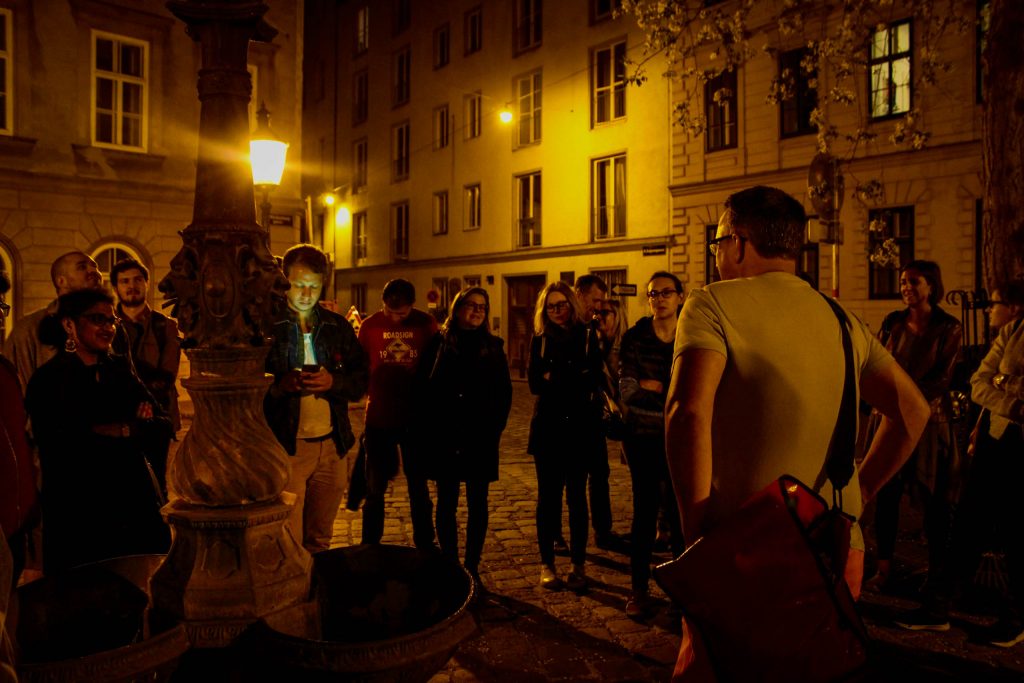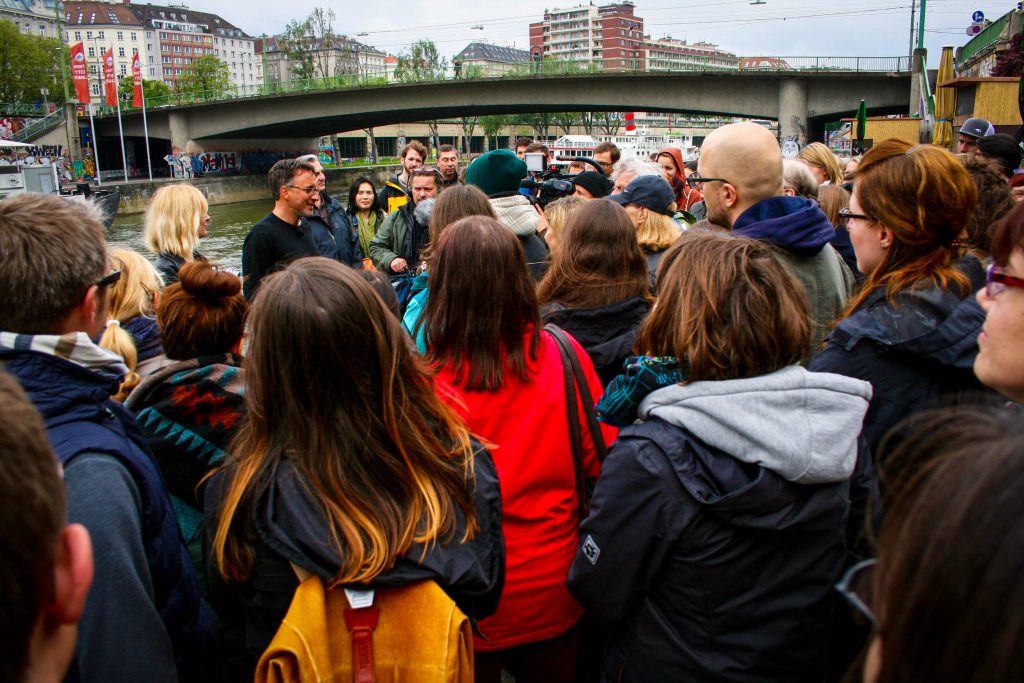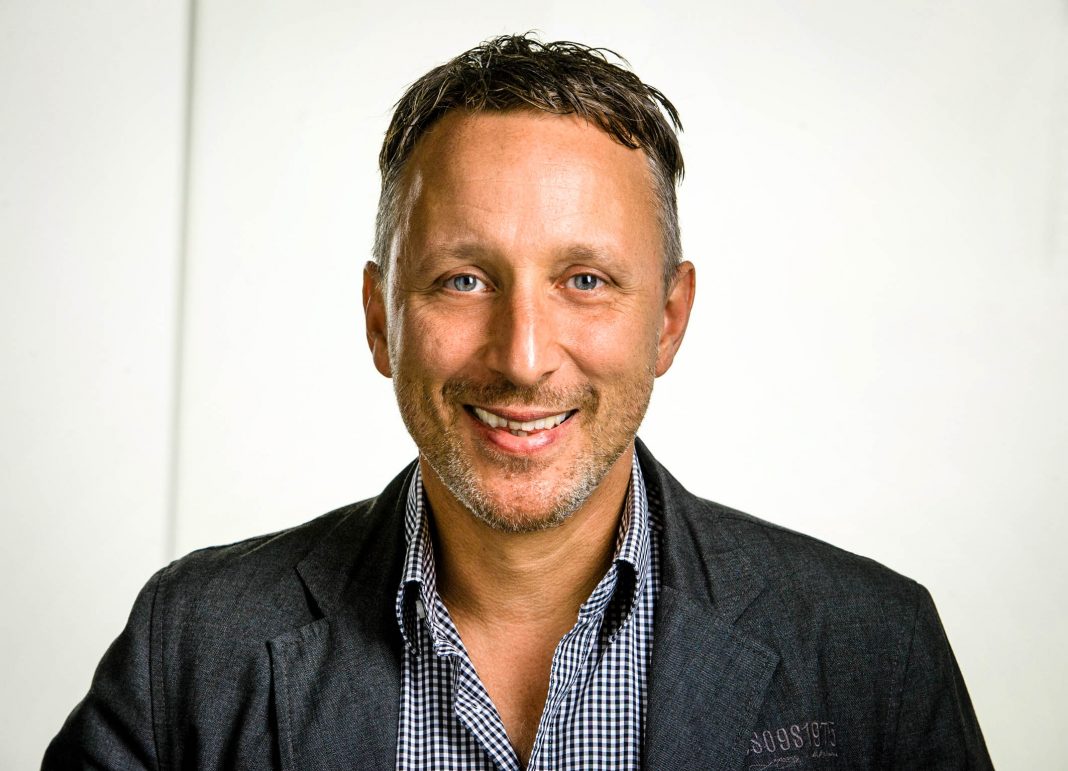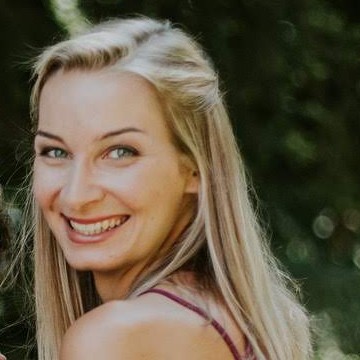Eugene Quinn is a man of many professions: he’s an urbanist and a DJ, a fantastic storyteller, a creative mind, and above all, a passionate walker. Eugene created more than 60 walking tours in Vienna – with 90% of the people coming on tours with him being Viennese. We sat down (stood up!) with the London-born, Vienna-based co-founder of Whoosh to chat about his concept of street capital, the perks of being a walker, and how walkability directly translates to liveability.
Describing himself as a rebellious optimist, Eugene’s work is all about creativity, interdisciplinarity, playfulness, and opening dialogue. All of this translates into the city storytelling he exercises with his one-of-a-kind tours through Vienna. What is it about walking that fascinates him the most? And what could we all get out of walking more?
It’s More Than a Mode of Transport, It’s a Lifestyle
When we walk, we explore. We experience the city on an eye level, we can go deeper into our ideas and reflect on them, we are more creative, and we can immerse ourselves fully in city life. Walking is good for your brain: it’s no coincidence that Aristotle held his lectures while walking, Beethoven valued walking as an integral part of his composition, and writers like Margaret Atwood feel like there are only two options when faced with writer’s block: going to sleep or taking a walk.
For Eugene, walking is simply a part of his lifestyle. He never learned to drive a car, and he’d rather walk than cycle, as cyclists tend to be a bit stressed by each other: “There’s no race to walk the fastest. If you have an idea, you can write it down, have a chat with people, and it’s good for your mental health.”
“Walking builds trust, it builds community. As a walker, Vienna still has this sense of intimacy.”
You can decode decades and centuries of architecture that the city is made of – none of which works while cycling or driving a car. Walking is faster than people think, and cities often offer shortcuts to pedestrians that no other mode of transport can use. The only thing you need is a pair of shoes, and then you’re literally good to go.
Having created more than 60 walking tours in Vienna – most of them off the beaten path, all of them with a special twist – we’re wondering: how did it all begin, why do so many Viennese join Eugene’s tours, and how are they different to a “regular” city tour?
From Monologues to Dialogues: Experiencing Your City
The secret behind this lies in an approach that goes way beyond your casual Sissi and Schnitzel tour, a monologue repeating itself. For Eugene, it all started back in 2015, when the Eurovision Song Contest, a celebration of kitschy bad taste, took place in Vienna, and Eugene thought, “let’s show all these visiting journalists that Vienna has got a great history of bad taste as well”. The Vienna Ugly Tour (of failed architecture) was born, and there is so much more that followed ever since.
With tours like the Midnight Walk, the Vienna Ugly Tour, the Naked Walk or Smells like Wien Spirit, Eugene adds in a social dimension, seeing walking as a means to enter into a fruitful dialogue with the city and its citizens. Rather than just retelling the same story over and over again, he invites participants to get to know the city through different lenses, and to share their own stories.
Eugene’s tours celebrate the diversity that makes up Vienna in a contemporary way, discussing what the city smells like (and where these smells actually originate from), what makes a building ugly, what makes a street liveable, what different district numbers (in Vienna) translate to, and how life takes places on the street. He describes his tours as “an interactive and democratic experience”.

The Power of Street Capital
This is also how his concept of street capital evolved. It builds out of social capital and is a new way of analysing and understanding the city, “a Fellini measure of the city”, as Eugene describes it. It’s a means of valuing the life that’s happening on the streets, and it’s a kind of capital that rich districts are lacking:
They’re mostly full of parked cars, with people spending as little time as possible on the streets – a stark contrast to poorer neighbourhoods, where life doesn’t take place behind closed doors but rather on the streets themselves. What is street capital all about?
“It’s a celebration of theatre and live music; it’s people drinking beer and eating on the streets, babies playing, people having an argument. It’s people living outside, instead of inside.” Basically, it’s a new scale of measuring neighbourhoods and a huge part of what makes a city liveable and enjoyable.
Even Car Drivers Want Cities for People
Eugene recalls Danish architect and urbanist Jan Gehl splitting cities into 60 km/h cities and 5 km/h cities, with cities that were designed before the 20th century basically all being 5 km/h cities.
They are designed to move through quite slowly, as cars didn’t influence the city design back then – roads don’t always go in straight lines, and there’s lots to see if you move slowly through them. “I think most people instinctively prefer five kilometre per hour cities. When we go on holidays, we usually go to old cities, even car drivers,” Eugene states assertively.
As soon as you want to spend time in a city and really experience it, walking is your number one option – even though it seems so obvious that we tend to forget it’s an option. “Parents get very excited when their baby makes its first steps.
It’s a triumph, it’s a key moment in life. After that, they totally forget about the fact that walking is a thing” – which is a pity, because it’s the most ecological form of transport, you can watch urban life going on while doing so, it doesn’t cost anything, and you can experience different atmospheres and moods to the fullest.
When asked for his favourite places to go for a walk, there’s two places instantly coming to his mind: “Coming from London, I love Brick Lane in East London. It’s an ethnic neighbourhood, but it’s also quite hip. Now a lot of artists live around there, and there are lots of parties, lots of music, quite a wild place. So much of European street culture is born in London, from street art to fashion to music to street food.
If you’re in Vienna, Donaukanal is difficult to beat. You get a spicy mix of street artists, students, joggers and cyclists and party people. The Donau looks pretty ugly, it’s brown and a bit grotty, but the street art changes every morning, which is exciting – it’s creative street culture in the heart of the city. It’s free and accessible for everybody. It’s one of the few places where the locals and visitors come together”.

You’re inspired but can’t currently visit Vienna? That shouldn’t stop you from getting started yourself!
Bringing City Storytelling to Your Hometown
The concepts of Eugene’s walking tours are by no means limited to the city of Vienna – they can be adapted and put into action in every city in the world. Eugene did city tours during the Urban Future conferences in Vienna and Oslo, and is planning to do so in Helsingborg 2022 as well.
Until then, check out Whoosh.wien for the manyfold projects Eugene has done and is currently doing and get inspired to follow his footsteps:
These formats are “a new way of looking at the city, which everybody can try out. I want people to copy and paste and play with them, and feedback to me about it”, he urges. So, get on your walking shoes and start exploring!


